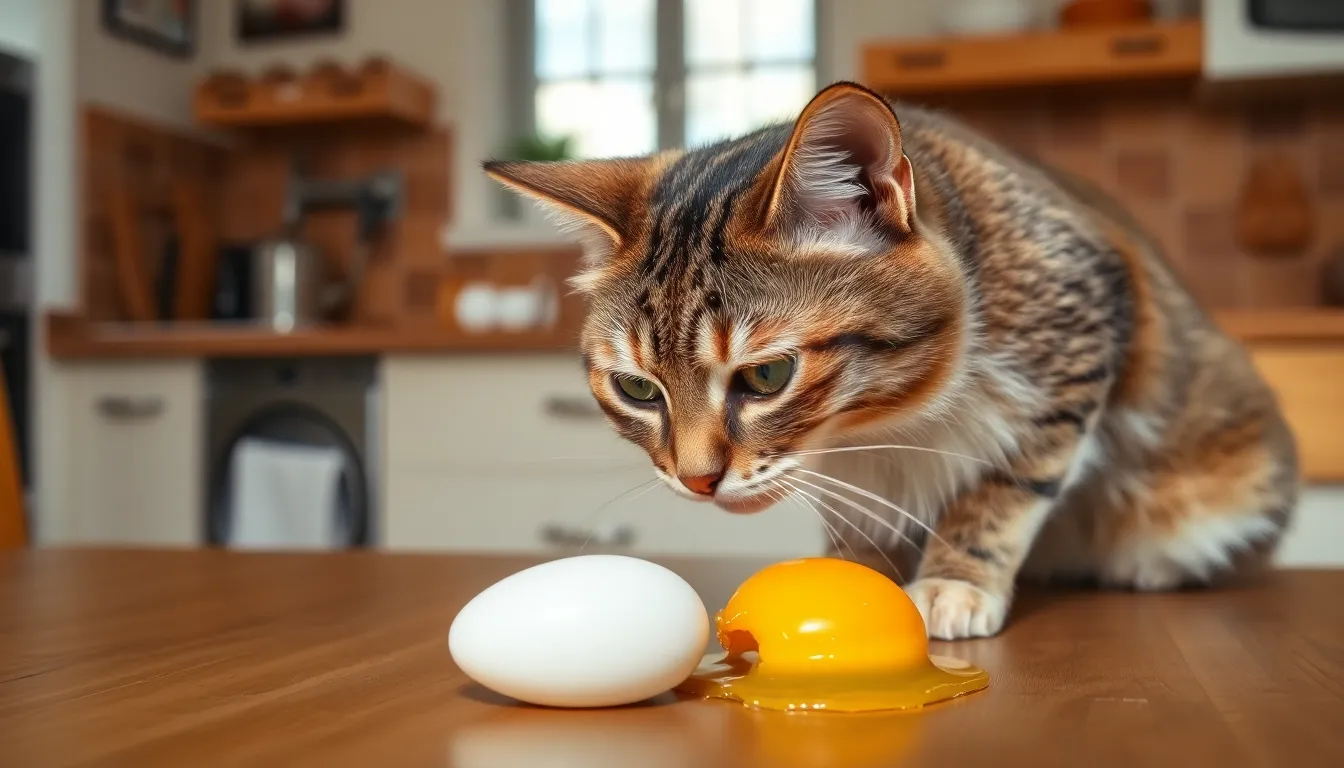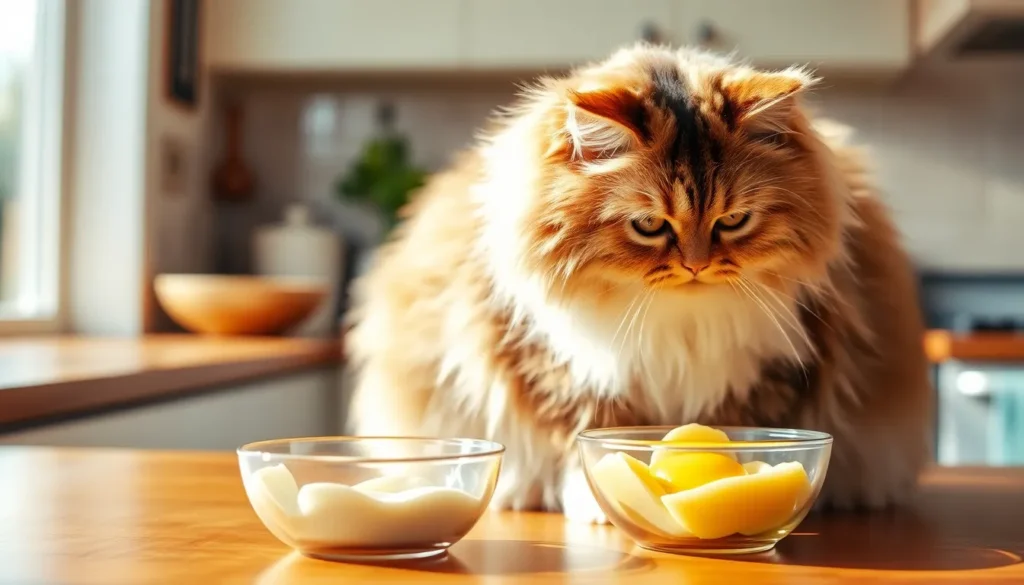Cats are known for their picky eating habits, but many owners wonder if they can safely share their breakfast staple: eggs. With a growing trend of pet owners looking to add variety to their cats’ diets, questions about the nutritional value and potential risks of feeding eggs to felines arise.
While eggs are packed with protein and essential nutrients, it’s crucial to understand how they fit into a cat’s diet. Not all foods that are healthy for humans translate well to our furry companions. This article dives into the potential benefits and risks of feeding eggs to cats, helping owners make informed decisions that prioritize their pet’s health and happiness.
Table of Contents
ToggleOverview of Cat Nutrition
Cats require a balanced diet to maintain optimal health. Their nutritional needs differ significantly from those of humans. Key components include proteins, fats, vitamins, and minerals.
Protein
Cats are obligate carnivores, meaning they thrive on animal-based proteins. Proteins provide essential amino acids, promoting muscle health and overall vitality. Common protein sources include chicken, fish, and beef.
Fats
Healthy fats are crucial for energy and skin health. They support the absorption of fat-soluble vitamins and contribute to a shiny coat. Sources of healthy fats for cats include fish oil and chicken fat.
Carbohydrates
While cats don’t have a high carbohydrate requirement, some carbohydrates can aid in digestion. Safe sources include pumpkin and sweet potatoes. However, grains and fillers should be avoided as they offer little nutritional value.
Vitamins and Minerals
Vitamins and minerals play vital roles in various bodily functions. Essential vitamins for cats include A, D, E, and several B vitamins. Minerals like calcium, phosphorus, and potassium are important for bone health and metabolic functions.
Hydration
Water is essential for every pet’s diet. Cats often derive moisture from their food, but fresh water should always be available. Dehydration can lead to serious health issues, including kidney disease.
Understanding these nutritional components helps ensure cats receive a complete and balanced diet, allowing for consideration of additional foods such as eggs.
Understanding Eggs as Food

Eggs can be a nutritious addition to a cat’s diet, but it’s crucial to understand their nutritional value and the myths surrounding them.
Nutritional Breakdown of Eggs
Eggs provide a rich source of protein, containing approximately 6 grams of protein per large egg. They also include essential amino acids, which support muscle development and overall health. Key vitamins found in eggs, such as B12 and riboflavin, contribute to energy metabolism and red blood cell production. Minerals like selenium and phosphorus in eggs play significant roles in maintaining healthy bones and immune function. Additionally, eggs contain fatty acids that contribute to healthy skin and a shiny coat. Moderation is vital, as excessive consumption can lead to imbalances in a cat’s diet.
Common Myths About Eggs
Several misconceptions exist regarding cats and eggs. One common myth suggests that raw eggs are unsafe due to the risk of Salmonella. While a slight risk exists, the chance of contamination is low. Cooking eggs eliminates this risk while preserving their nutritional benefits. Another myth claims that egg whites are harmful for cats, but this is misleading. Egg whites provide protein and biotin, a vitamin important for skin and coat health. Feeding eggs in moderation ensures cats gain the nutritional advantages without adverse effects.
Potential Risks of Feeding Eggs to Cats
Feeding eggs to cats presents potential risks that pet owners should be aware of, as some cats may react negatively to this food.
Allergies and Intolerances
Some cats may develop allergies or intolerances to eggs, which can lead to gastrointestinal upset or skin reactions. Symptoms may include vomiting, diarrhea, or itching. Monitoring a cat’s reaction after introducing eggs is crucial. If any adverse effects arise, discontinue feeding eggs and consult a veterinarian for guidance.
Bacterial Contamination
Bacterial contamination poses another concern when feeding eggs to cats. Raw eggs can harbor Salmonella or E. coli, pathogens that could cause severe illness in cats and humans. Cooking eggs thoroughly eliminates these bacteria while preserving their nutritional value. Ensuring eggs are fully cooked before feeding them to cats significantly reduces the risk of contamination.
Benefits of Eggs for Cats
Eggs offer several nutritional benefits that can enhance a cat’s diet when introduced properly. Their rich composition of protein and other vital nutrients supports a cat’s overall health and well-being.
Protein Source
Eggs serve as an excellent source of high-quality protein, providing approximately 6 grams per large egg. Protein plays a crucial role in building and maintaining muscle mass. Cats require protein for various bodily functions, including tissue regeneration and hormone production. Incorporating eggs into a cat’s diet can bolster muscle health, especially in active or aging felines.
Other Nutrients in Eggs
Aside from protein, eggs contain essential nutrients beneficial for cats. These include:
- Amino Acids: Eggs provide a complete profile of amino acids, critical for various biological processes.
- Vitamins: Eggs are rich in vitamin B12 and riboflavin, which support energy metabolism and overall vitality.
- Minerals: Selenium and phosphorus found in eggs contribute to strong immune function and bone health.
Overall, the diverse nutrient profile of eggs can complement a balanced diet for cats, supporting their energy levels and overall health.
Recommendations for Feeding Eggs to Cats
Incorporating eggs into a cat’s diet can offer nutritional benefits, but preparation and portion size are crucial. Proper cooking methods and controlling portions ensure that cats receive the benefits without facing risks.
Cooking Methods
Cooking eggs before feeding them to cats significantly reduces the risk of pathogens such as Salmonella and E. coli. Common cooking methods include:
- Boiling: Boil eggs until fully cooked. This method preserves nutrients while making them safe.
- Scrambling: Scramble eggs with minimal, pet-safe seasoning. Avoid adding butter or oils, as these can be unhealthy for cats.
- Poaching: Poach eggs by simmering them in water. This method keeps the eggs soft while ensuring they are fully cooked.
Choose a method that suits the cat’s preferences. Always allow the eggs to cool before serving to prevent burns.
Portion Control
Portion control is essential when feeding eggs to cats. Given their high protein content, eggs should only comprise a small part of a cat’s overall diet. Recommendations include:
- Small Servings: Offer no more than one egg per week for an average-sized cat. Adjust the serving size based on the cat’s weight and activity level.
- Mixing: Combine a small amount of cooked egg with regular meals to enhance flavor while ensuring balanced nutrition.
- Monitoring: Observe the cat’s reaction to eggs. If any signs of digestive upset or allergy appear, reduce or eliminate the egg servings.
By practicing careful portion control, egg consumption can be a rewarding addition to a cat’s diet without compromising its health.
Feeding eggs to cats can be a nutritious addition when done thoughtfully. Their high protein content and essential nutrients can support a cat’s overall health. However moderation is key to prevent any potential health issues.
Monitoring a cat’s reaction to eggs is crucial as some may experience allergies or intolerances. Cooking eggs thoroughly eliminates the risk of harmful bacteria while preserving their benefits.
By incorporating eggs as an occasional treat and following recommended guidelines, cat owners can enhance their pet’s diet and contribute to their vitality and well-being.



